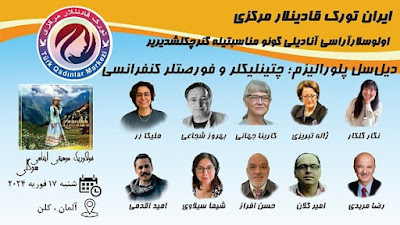Radio Zamaneh – February 20, 2024
 |
| Group photo of some of the participants from Iran's linguistically minoritized communities at the conference titled "Linguistic Diversity: Challenges and Opportunities" held in Germany. |
Ahead of February 21, International Mother Language Day, a group of civil activists gathered on Saturday, February 17, 2024, for a one-day conference titled "Linguistic Diversity: Challenges and Opportunities" in Cologne, Germany. The event was hosted by the Turkish Women’s Center.
The conference aimed to address the challenges posed by Iran’s monolingualism as a multi-ethnic country, explore multilingual education systems in other countries and discuss suitable strategies for Iran considering its current ethnic context, showcase Iran’s linguistic and ethnic diversity, and create a platform for equal dialogue among all Iranian nationalities.
Speakers discussed issues of linguistic rights discrimination and Iran’s diverse demographic structure, examining the challenges and opportunities in this field. The presentations were divided into academic and artistic segments, where the speakers, based on their areas of expertise, analyzed various topics and proposed solutions for combating linguistic discrimination.
The event was moderated by Farzaneh Baluch, a Baloch activist; Umay Radmehr, a Turkish activist; Wijdan Abd al-Rahman, an Arab activist; and Sara Afrasiabi, a Kurdish activist. It began with the reading of a statement in six languages: Baluchi, Turkish, Arabic, Kurdish, Persian, and English.
Sheema Silavi, an Arab speaker, introduced the Unrepresented Nations and Peoples Organization (UNPO) and discussed its projects regarding the right to mother-tongue education for unrepresented nations.
The next speaker, Melika Zar from the 6Rang group, spoke about the “shared pain” of ethnic communities and the LGBTQ+ community, addressing violations against individuals who do not conform to societal norms regarding sexual orientation. She advocated for equal sexual and gender rights in Iran.
Iraj Irandoust, a Baloch speaker representing the Balochistan Human Rights Group, gave a presentation. Following him, Hassan Afras, a Turkish political activist from the Azerbaijan Democratic Party, spoke about forced assimilation and its harms, sharing personal experiences of humiliation and discrimination in the realm of mother-tongue language rights.
Jaleh Tabrizi, a human rights activist and secretary of the Ark Human Rights Association of Azerbaijan, discussed the relationship between mother-tongue education and sustainable development. She explained the concept of “linguistic disenfranchisement,” drawing on examples from various countries and their activities within the United Nations Human Rights framework.
Omid Aghdami, a leftist activist, spoke about “ethnic rights and mother-tongue education from the perspective of leftist movements.” He noted that demands for linguistic rights in different regions of Iran are gaining momentum.
The next speaker, Behrouz Shojaei, a Kurdish scholar, addressed decolonizing education, linguistic citizenship, and justice in his talk.
Negar Golkar, a Turkish scholar, highlighted the importance of a flexible education system accommodating different languages and the necessity of mother-tongue education.
Finally, Reza Moridi, an Iranian-Canadian politician, presented the multilingual education system in Canada. He shared examples and experiences from his tenure as the Minister of Higher Education in one of Canada’s provinces and his time as a Member of Parliament. He argued that Canada’s federal system is the most suitable political model for Iran after the Islamic Republic.
During the speeches, in addition to discussions about experiences of linguistic discrimination, the introduction of the "End Monolingualism" campaign and the hashtag "#MeAndFarsi", two other expert talks were presented. Ahmad Sedaghaty, a psychiatrist and psychologist, spoke about the necessity of education in one’s mother tongue, while Mohsen Rasouli, a civil activist, discussed multilingual education systems in other countries.
At the conclusion of the event, Amir Kalan, a researcher in language education, examined suitable strategies for a multilingual educational system centered on mother-tongue instruction. He also addressed questions from the conference attendees.
In the cultural segment of the program, Yusuf Kor, a Turkmen speaker, introduced Makhtumquli Faraghi and recited poetry. Following this, Sogoli, a Gilaki artist, performed folkloric music from various Iranian ethnicities for the audience. The conference concluded with a folkloric dance performed by participants and guests in the event hall.

